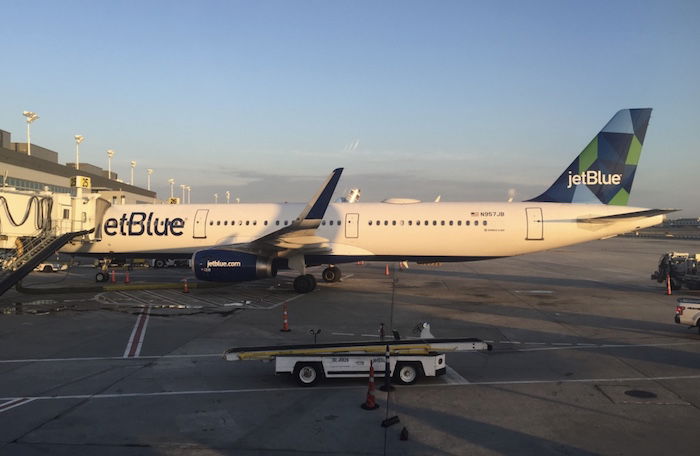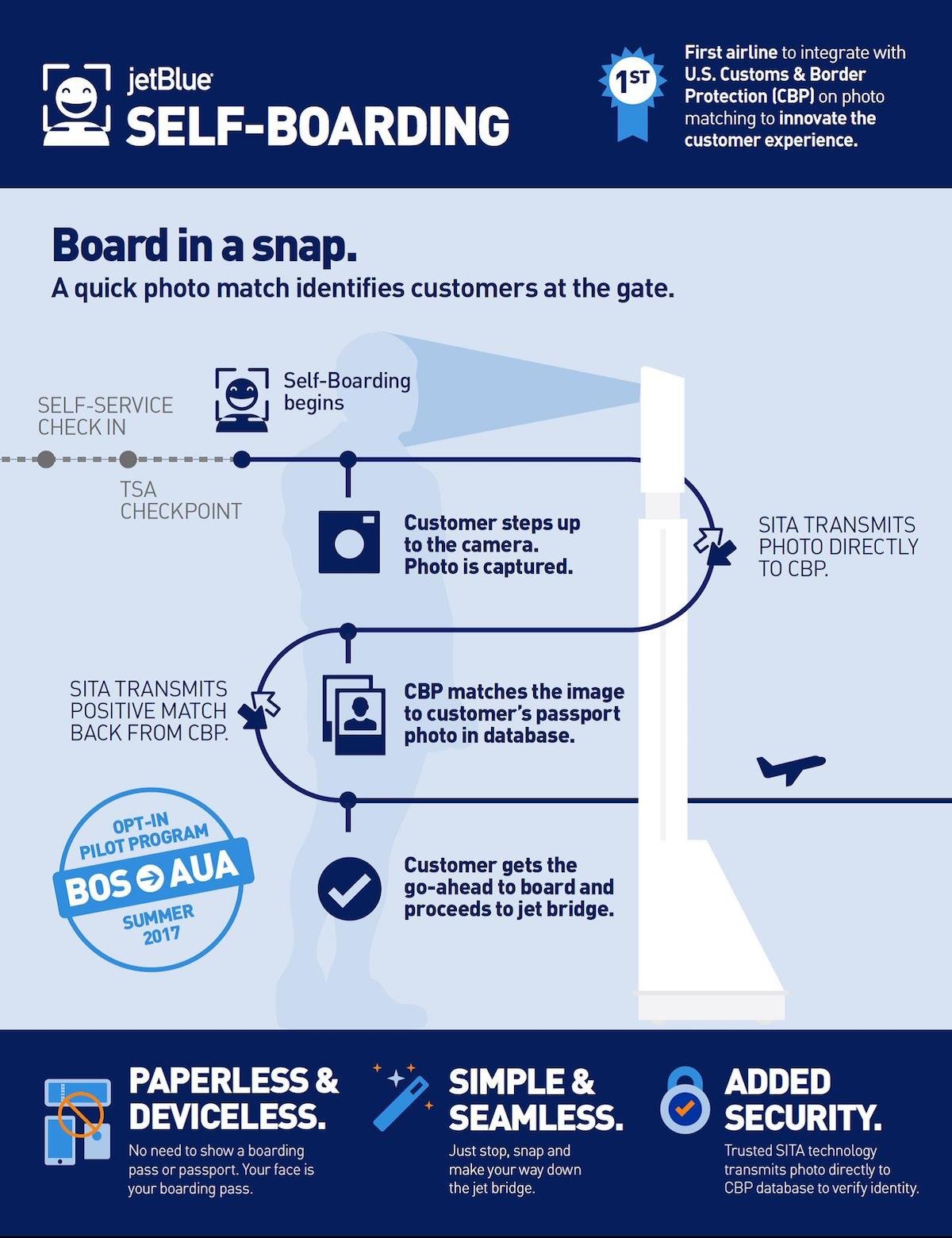Often I wonder whether technology makes travel better or worse. Don’t get me wrong, on some level it sure makes things easier, but then sometimes you’re stuck behind people who take forever to get their mobile boarding pass to work when passing through security, at the gate, etc. Other times you need help at a customer service desk, but the agents say they’re not allowed to help you unless you use the kiosk first.
Well, JetBlue will soon be testing out a new way to board using the powers of technology that seems awesome. JetBlue will be collaborating with the US Customs and Border Protection Agency and SITA to test a new paperless and deviceless self-boarding process. JetBlue is the first airline to work with the CBP to use biometric and facial recognition technology to verify customers at the gate during boarding. This trial will start in June on JetBlue’s Boston to Aruba flight.

Per the press release, here’s how the process will work:
The program will start in June on flights from Boston’s Logan International Airport to Aruba’s Queen Beatrix International Airport. Customers can participate without any prior enrollment or registration.
Customers who opt in during the boarding process can put away their boarding passes and devices and simply step up to the camera for a quick photo. The custom-designed camera station will connect to CBP to instantly match the image to passport, visa or immigration photos in the CBP database and verify flight details. The customer will be notified on an integrated screen above the camera when they are cleared to proceed to the jet bridge. The setup will move JetBlue crewmembers from behind the counter to interact with customers and assist throughout the process. JetBlue will issue iPad minis to crewmembers, giving them mobility to monitor and manage the boarding process while interacting with customers.
And here’s the chart showing how the process will work:

What an awesome concept! This technology is actually practical, as there’s no boarding pass or mobile boarding pass required — instead you can board with a picture.
I suspect it will be a while before this is expanded significantly, though I appreciate the idea.





Will someone whose face is covered for religious reasons be forced to stand exposed in front of everyone? I am not seeing any mention of private booths.
@nick .... how is it not?
Bill - if nothing that "isn't that hard" to do was never improved upon, we would be back in the stone ages...
I'll concede that I'm something of a luddite, but this really feels like two things:
(1) A solution in search of a problem; and
(2) Something that'll work just fine until 50 people are ready to use it and some gremlin causes the system to hiccup and suddenly you've got a total mess.
Frankly, as the BA and DL fiascoes this year have shown, IMHO airlines should be looking for ways to avoid...
I'll concede that I'm something of a luddite, but this really feels like two things:
(1) A solution in search of a problem; and
(2) Something that'll work just fine until 50 people are ready to use it and some gremlin causes the system to hiccup and suddenly you've got a total mess.
Frankly, as the BA and DL fiascoes this year have shown, IMHO airlines should be looking for ways to avoid being even more reliant on technology rather than coming up with new and creative Achilles' Heels to add to their systems.
Is it really that hard to scan a boarding pass that we need to do this? I can see this taking three times as long with some glitch or them fiddling with the cameras etc. What's next? You need to go through facial recognition to leave your home in the morning so the government can track you? I just don't see how this in anyway speeds up the process.
Uh The TSA first priority is not safety or convenience. It never will be they have security in their name.
Oh, and remind me to grow a beard
Kudos to JJJ...honestly, all the needs of the world and this is necessary? How about finding ways to make TSA operate in a way that puts passengers convenience and safety at the forefront. What a waste of time. I will remember this when I can't take my laptop on Emirates.
Gol also made some publicity about doing this in the coming months.
I'm curious if there will be a feature built into the system that prevents people from boarding if their row hasn't been called yet. JetBlue boards from the rear, so if they call rows 20 and up to board and you're seated in row 15 and not a Mosaic member, will it say "sorry, you can't board yet?" If so, that could be kind of cool -- human agents are inconsistent about enforcing boarding order.
For those who may think this replaces the boarding pass (either paper or electronic), think again. Actually go back to the jetblue info-graphic that Lucky put into his post. How will a passenger get past the TSA Security checkpoint without a boarding pass?
Now, that said, I suppose that's phase 2 or step 2. They are just testing it at the gate, perhaps because they feel that capturing it at the TSA security checkpoint will...
For those who may think this replaces the boarding pass (either paper or electronic), think again. Actually go back to the jetblue info-graphic that Lucky put into his post. How will a passenger get past the TSA Security checkpoint without a boarding pass?
Now, that said, I suppose that's phase 2 or step 2. They are just testing it at the gate, perhaps because they feel that capturing it at the TSA security checkpoint will be easy enough to implement.
Nice idea, and it has potential. However, time savings aren't going to be significant, if any.
BA have already rolled this out in Terminal 5
BA have already roled this out in Terminal 5
@Lucky -- Thanks for your response. As more businesses offer customer experience based on biometric data access, I'm genuinely concerned about their ability to safeguard our information. It doesn't look like the current political environment in the U.S. will make it likely for either the administration or the Congress to propose new security standards for storing, transferring, and sharing individual biometric information. (Also legislations regarding technologies tend to lag far behind innovations in general...) The...
@Lucky -- Thanks for your response. As more businesses offer customer experience based on biometric data access, I'm genuinely concerned about their ability to safeguard our information. It doesn't look like the current political environment in the U.S. will make it likely for either the administration or the Congress to propose new security standards for storing, transferring, and sharing individual biometric information. (Also legislations regarding technologies tend to lag far behind innovations in general...) The digitalization of customer services like such is kind of a double-edged sword.
Are most people in the U.S. concerned about private businesses capturing and storing our personal biometric data? My past discussions on this issue with Americans and Germans showed significant differences in the basic definition of privacy. Germans, and to a certain extend Europeans in general, are more concerned about private entities and even government agencies obtaining and utilizing personal information.
@Lucky, since you are both German and U.S. citizen, how do you feel about...
Are most people in the U.S. concerned about private businesses capturing and storing our personal biometric data? My past discussions on this issue with Americans and Germans showed significant differences in the basic definition of privacy. Germans, and to a certain extend Europeans in general, are more concerned about private entities and even government agencies obtaining and utilizing personal information.
@Lucky, since you are both German and U.S. citizen, how do you feel about this? (Aside from your obvious excitement about this new technology.)
@ B.V.Dorheim -- I'm sure this will be a concern for many, though personally it's not something that concerns me much. Ultimately the airline would have all your passport information for an international itinerary anyway, so I'm not sure what the incremental risk is here. However, I know a lot of people share your concerns.
OMG laughed out loud at all the prior comments
But seriously CBP would LOVE this technology to be widespread because it's a fast and easy way to actually implement exit border controls in the USA as mandated by Congress ... and actually it's about the only way to effectively do it without ripping apart airports and spending billions of dollars the US doesn't have and won't shell out for these modifications. Oh so Congress...
OMG laughed out loud at all the prior comments
But seriously CBP would LOVE this technology to be widespread because it's a fast and easy way to actually implement exit border controls in the USA as mandated by Congress ... and actually it's about the only way to effectively do it without ripping apart airports and spending billions of dollars the US doesn't have and won't shell out for these modifications. Oh so Congress won't find the money to implement exit border controls and instead will mandate the airlines to pay for these exit border controls through passenger tax levies? Let me find that emoji again
This is great if it works properly. Imagine the mess if the system is down?
This means making CBP systems available to JetBlue systems. I'm sure both systems are completely secured against hackers.
Forgot to mention an excellent book/audio-book titled "Rise of the Robots: Technology and the Threat of a Jobless Future". It highlights/confirms what we are already seeing, that technology is now at the point where machines don't merely assist people in doing their jobs, machines/AI can now do them without an operator better and faster than people possible can.
If technology can produce driverless cars and pilotless aircraft, and if thinking machines can diagnose illnesses faster...
Forgot to mention an excellent book/audio-book titled "Rise of the Robots: Technology and the Threat of a Jobless Future". It highlights/confirms what we are already seeing, that technology is now at the point where machines don't merely assist people in doing their jobs, machines/AI can now do them without an operator better and faster than people possible can.
If technology can produce driverless cars and pilotless aircraft, and if thinking machines can diagnose illnesses faster than a doctor can, what are people good for?
So, what happens in the case of a software failure?
It's not only the boarding pass that this replaces, but also the manual passport double check upon boarding. I have a feeling CBP is pushing this because they think this is more accurate than a gate agent checking.
Future cardboard sign on homeless person: "Will check boarding passes and photo IDs for food."
*luddite
I'm no ludiyea, but why are we reinventing the piece of paper?
@J how is this more intervention?
I would love them to also fix TSA.
Yes, that's what I need. More government intervention in my life.....
The machines are taking our jobs!!
Because boarding passes are something so hard to manage they need to be fixed.